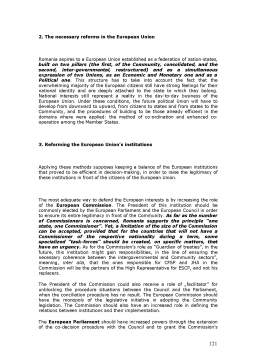Extras din proiect
Since the creation of the European Union its purpose has been to unite the European continent into one cohesive organization. In order for this goal to be fully realized all European nations must be included under this conglomeration of states. Unfortunately the process is not quite so simple. It takes years of careful evaluation of numerous factors most importantly including economic status, respect for international law and basic human rights, and military status amongst other numerous yet equally important facts. Before a state can be admitted it must first be determined that by admitting the state that it will have a generally good affect on the community as a whole and not simply benefit any single nation. Political orientation also plays a large role in deciding whether or not to accept a nation, since the organization was partially founded on the idea of “self determination”. After taking into consideration all these facts it is easy to see why it takes so long to approve a state for membership within the EU. Any hastily made decisions could quite easily have long lasting socio-economic impacts on other members of the union and make them weary to admit new members.
The European Union has been enlarging ever since it was created at the beginning of the 1950’s. The founding members called upon the people of Europe” who share their ideas to join their efforts”. Since then, it has grown from the initial six members to nine, ten, twelve and then to the current fifteen through a series of enlargements. The process is still continuing. The EU is now negotiating with twelve more candidates for membership, and preparing for negotiations with Turkey, as soon as the country fulfils the political accession criteria, including respect for human rights.
This latest enlargement is a consequence of the very nature of the EU. The success of the EU and the values it is based on has attracted successive waves of new members, from countries with a wide variety of economic and political backgrounds. Their integration into the EU has each time deepened the quality of the EU, for existing member states and new member states. Each successive enlargement has brought benefits to Europe’s citizens, new opportunities for European businesses and wider acceptance of European norms in fields ranging from consumer and environmental protection to political rights and social provision. The organic growth has enriched Europe as a whole.
Enlargement is one of the most important opportunities for the European Union as it begins the 21st Century. Its historic task is to further the integration of the continent by peaceful means, extending a zone of stability and prosperity to new members. In June 1993, at its Summit in Copenhagen, the European declared “the associated countries of Central and Eastern Europe that so desire shall become members of the Union”. In December 1997, at Luxembourg the European Council launched the process that will make enlargement possible. This process presently embraces thirteen countries: Romania, Bulgaria, Cyprus, the Czech Republic, Estonia, Hungary, Latvia, Lithuania, Malta, Poland, the Slovak Republic, Slovenia and Turkey. Accession negotiations are underway with the first twelve, and in June 2001 at Göteborg the European Council affirmed that the objective is to complete them by the end of 2002 with these countries that are ready to join, so that they can take part as members in the European Parliament’s elections of 2004.
The EU has a long history of successful enlargements. In 1957 six founding members signed the Treaty of Rome: Belgium, France, Germany, Italy, Luxembourg and the Netherlands. Four enlargements have followed:
1973: Denmark, Ireland and the United Kingdom
1981: Greece
1986: Portugal and Spain
1995: Austria, Finland and Sweden
The benefits of enlargement are both political and economic, and can be summarized as follows:
- The extension of the zone of peace, stability and prosperity in Europe will enhance the security of all its peoples.
- The addition of more than 100 million people, in rapidly growing economies, to the EU’s market of 370 million will boost economic growth and create jobs in both old and new member states.
- There will be a better quality of life for citizens throughout Europe as the new members adopt the EU policies for protection of the environment and the fight against crime, drugs and illegal immigration.
- Enlargement will strengthen the Union’s role in world affairs – in foreign and security policy, trade policy, and the other fields of global governance.
The Accession process from negotiations to ratification
On the basis of the recommendations of the European Commission in December 1997, the Luxembourg European Council decided to launch an “overall enlargement process” for all countries wishing to join the EU. It encompasses:
- The European Conference, which brings together the countries aspiring to join the EU. The Conference is a multilateral forum for discussing issues of common interest, such as foreign and security policy, justice and home affairs, regional co-operation and economic matters. This conference met for the first time in London on 12 March 1998. In December 1999, the Helsinki European Council announced a review of the future of the European Council, so as to take account of the evolving situation. The Nice European Council in December 2000 concluded that the Balkan countries
- covered by the stabilization and association process and the EFTA countries be invited to attend as prospective members.
- The accession process which was launched in Brussels on 30 March 1998 and encompasses all ten Central and Eastern European countries, Cyprus, Malta and Turkey. It is an evolving and inclusive process in the sense that all these countries are destined to join the EU on the basis of the same criteria.
Preview document
Conținut arhivă zip
- European Union.doc














































































































































